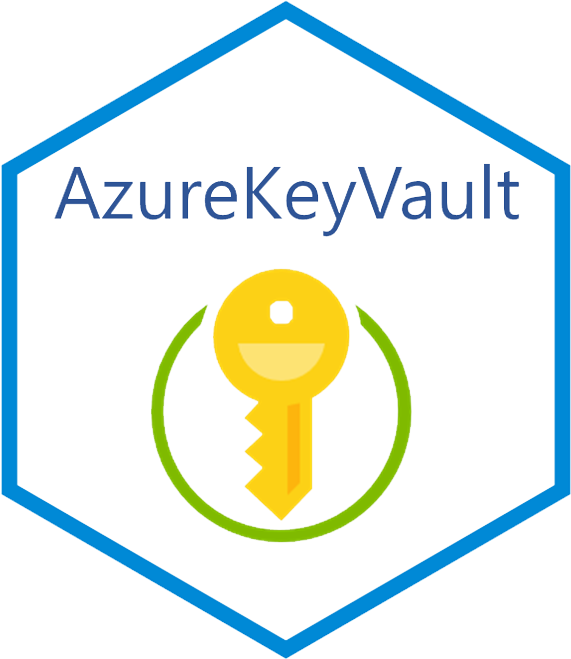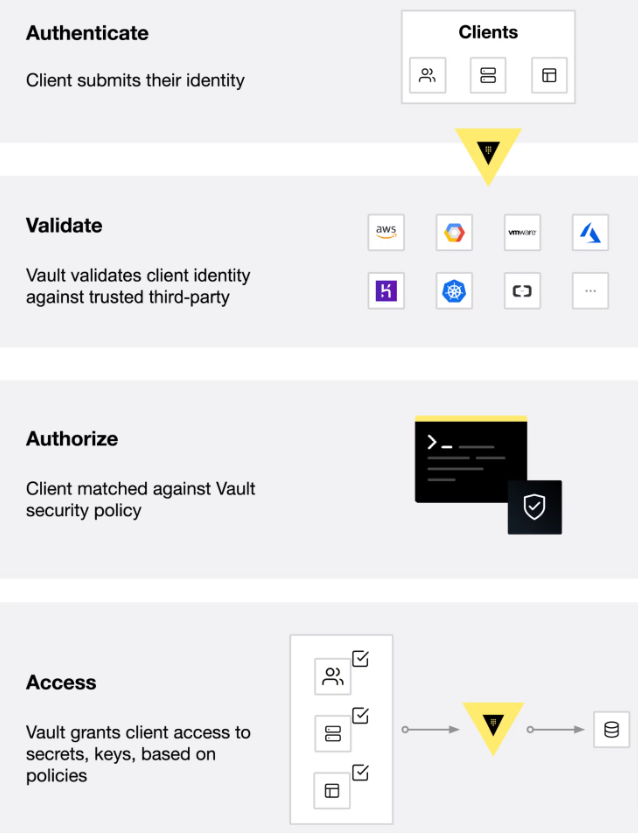Azure Key Vault vs HashiCorp Vault: Comparison

With so many organizations moving to cloud-based infrastructures, the need for security management has become more essential than ever. Azure Key Vault and HashiCorp Vault are two leading cloud solutions for safeguarding sensitive information.
While both of them are used for managing secrets, their approaches, features, and integrations can differ significantly, which we are going to discuss in this blog.
Before we move forward to make a thorough comparison between Azure Key Vault and HashiCorp Vault, let’s first have a quick overview of what exactly Vault is!
Vault is an open-source tool designed for securely managing secrets, encryption keys, and other sensitive data. It basically provides a central repository for storing and accessing secrets, with features aimed at improving security, managing access control, and facilitating secret rotation.
What is Azure Key Vault?

Developed by Microsoft, Azure Key Vault is a cloud service used for resolving several security concerns, like:
- Secrets Management: Firmly or securely store and control access to tokens, passwords, certificates, API keys, and others.
- Key Management: Used as a Key Management solution that makes it easy to make and control the encryption keys, which are then used for data encryption.
- Certificate Management: Helps provisioning, managing, and deploying public and private Transport Layer Security/Secure Sockets Layer (TLS/SSL) certificates, code signing certificates.
Further, it integrates seamlessly with other services, making it well- suited for applications hosted on Azure. With that being said, Azure Key Vault is a managed service provided by Azure, meaning Microsoft handles the infrastructure and maintenance, offering simplicity and ease of use.
| Name of Product | Validation Needs | Issuance Time | Our Price |
|---|---|---|---|
| Azure Key Vault Cloud Code Signing Certificate | Business | 1-5 Days | $369.99/yr |
| Azure Key Vault EV Cloud Code Signing Certificate | Extended | 3-5 Days | $519.99/yr |
What is HashiCorp Vault?

HashiCorp Vault is an identity-based secret and encryption management system that provides encryption services and is gated by authentication and authorization methods.
Here, the secret can be anything that you want to protect, such as tokens, API keys, passwords, encryption keys, or certificates.

It works in four different stages, as explained below.
- Authenticate: In this initial phase, the vault confirms the identity of the client requesting access. The provided credentials are verified using the chosen authentication method. After the successful authentication, a token is generated and issued.
- Validation: Next, Vault performs an additional layer of validation by comparing the client’s information against external, trusted sources, including Github, LDAP, AppRole, and more.
- Authorize: Once authenticated and validated, the client’s activities are then governed by Vault’s security policies.
- Access: With authentication, validation, and authorization steps completed, the client is now allowed to access the secrets or perform the actions as defined by their associated policies.
Pros and Cons of Azure Key Vault & HashiCorp Vault
Here are some of the pros and cons of both security management systems.
Pros of Azure Key Vault
- Azure Key Vault offers a secure and centralized location to store and protect sensitive data like passwords, certificates, and encryption keys. This helps in maintaining the security of data systems and minimizes the risk of data breaches.
- It uses industry-standard algorithms, key lengths, and HSMs where authentication is done through Azure Active Directory.
- Azure Key Vault can be integrated with storage accounts, container registries, and other Azure services, making it easy to incorporate into existing Azure-based applications and workflows.
- As a fully managed service by Microsoft, Azure Key Vault reduces users’ operational overhead, including maintenance and backups.
- Microsoft Azure, including Azure Key Vault, adheres to various compliance standards and certifications. This provides assurance for regulatory requirements across industries and reduces the risk of non-compliance.
Cons of Azure Key Vault
- Azure Key Vault is primarily designed to work within the Azure ecosystem. This limits the flexibility of organizations operating in multi-cloud or hybrid environments.
- Its costs can increase based on usage, especially for high-volume operations.
Pros of HashiCorp Vault
- Hashicorp Vault is a popular choice and is widely used for secrets management by reputed companies, such as Intel, Ubisoft, Bank of America, Adobe, and Starbucks.
- HashiCorp Vault differentiates itself by generating on-demand secrets for some systems, including AWS or SQL databases and encrypting the information before storing them.
- It is open-source and cloud-agnostic, which means it can be seamlessly integrated with existing workflows. Also, Hashicorp Vault has its own cloud platform that offers vault-as-a-service.
- Along with secrets management, it also offers encryption-as-a-service functionalities. This enables comprehensive encryption solutions for various use cases, including management of certificates and keys, encryption/decryption operations, secrets generation, and tokenization.
- Every request and response in the HashiCorp Vault is audited and authenticated.
Cons of HashiCorp Vault
- While HashiCorp Vault is powerful, setting it up can be complex and time-consuming. Its extensive feature set and flexibility can lead to a steep learning curve for users.
- The process of inspecting detailed audit logs for tracking access can be tedious.
- The Vault user interface (UI) lacks some useful features, particularly for administrative tasks and configuration management.
- Users may encounter issues with Vault upgrades, including bugs and compatibility issues, even with minor releases.
Major Difference to Know
Market Share
- Azure Key Vault has a 0.63% market share in the Identity And Access Management category.
- HashiCorp Vault has a 0.11% market share in the Identity And Access Management category.
Deployment
- Azure Key Vault is a managed service provided by Azure, meaning Microsoft handles the infrastructure and maintenance, offering simplicity and ease of use.
- HashiCorp Vault requires deployment and configuration by the user, whether on-premises or in the cloud, allowing for more control but also requiring more effort in setup and maintenance.
ROI (Return on Investment)
- Azure Key Vault offers secure storage, efficient access to keys and secrets, and increased productivity.
- HashiCorp Vault provides enhanced security, control over access privileges, and improved compliance.
Integration
- Azure Key Vault can be integrated easily with other available Azure services, making it well-suited for applications hosted on Azure.
- HashiCorp Vault can integrate with a wide range of cloud providers, on-premises systems, and third-party tools, providing more flexibility for multi-cloud or hybrid cloud environments.
Features
- Azure Key Vault offers secure storage of secrets, keys, and certificates, with features like access policies, versioning, and hardware security module (HSM) support.
- HashiCorp Vault offers comprehensive functionality such as dynamic secrets generation, data encryption as a service and effective management of credentials in an encrypted manner.
Community and Support
- Both Azure Key Vault and HashiCorp Vault have active communities and support. Former benefits from Microsoft’s extensive support network while Latter has a vibrant open-source community and commercial support options available.
Security
- Azure Key Vault offers robust security features, including FIPS 140-2 Level 2 validated HSMs, data encryption at rest and in transit, and role-based access control (RBAC). It is integrated with Azure Active Directory for authentication, providing centralized identity management.
- HashiCorp Vault provides encryption at rest and in transit, role-based access control (RBAC), and audit logging for compliance. It also supports various authentication backends, including LDAP, AWS IAM, Azure AD, etc., providing flexibility in authentication mechanisms.
Pricing
HashiCorp Vault offers three different pricing models,
- HCP Vault Secrets (Free till 25 secrets per month)
- HCP Vault (Starts at $1.58 per hour)
- Enterprise (Customer pricing according to different requirements).
Pricing of Azure Key Vault is based on usage, with costs incurred for operations like key storage, secret storage, and key operations. Vaults are offered in two service tiers, i.e., standard and premium. (as shown below)

For Software-protected keys:

For HSM-protected keys:

Conclusion
To conclude, both Azure Key Vault and HashiCorp Vault have their advantages and disadvantages when it comes to managing secrets and keys.
Recommended: AWS vs Azure: Which one to Choose for Better Cloud Computing
Azure Key Valult’s managed service approach simplifies key management and ensures smooth operation within the Azure ecosystem, while the other one provides unparalleled flexibility and adaptability, catering to diverse deployment environments, whether on-premises, in the cloud, or in a hybrid setup.
In a nutshell, the choice between choosing one depends on factors such as
- Existing infrastructure,
- Specific requirements and
- Preference for features or deployment models.
So, analyze what exactly your business is demanding and choose the one accordingly. SignMyCode offers Cloud Code Signing for different platforms. Just take it and manage your cert quickly.

